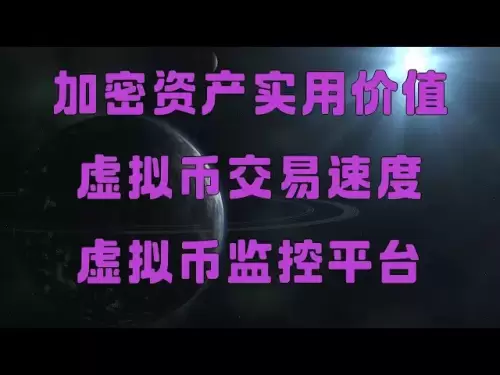-
 Bitcoin
Bitcoin $106,731.2224
-1.05% -
 Ethereum
Ethereum $2,444.9804
-1.20% -
 Tether USDt
Tether USDt $1.0003
0.01% -
 XRP
XRP $2.1882
0.09% -
 BNB
BNB $651.1435
-0.61% -
 Solana
Solana $148.3252
-2.09% -
 USDC
USDC $1.0000
0.01% -
 TRON
TRON $0.2787
0.55% -
 Dogecoin
Dogecoin $0.1598
-3.16% -
 Cardano
Cardano $0.5520
-2.43% -
 Hyperliquid
Hyperliquid $39.0960
-2.64% -
 Bitcoin Cash
Bitcoin Cash $516.9519
2.98% -
 Sui
Sui $2.7011
-2.95% -
 Chainlink
Chainlink $13.0582
-1.71% -
 UNUS SED LEO
UNUS SED LEO $8.9250
-2.53% -
 Stellar
Stellar $0.2359
-0.18% -
 Avalanche
Avalanche $17.3856
-3.73% -
 Toncoin
Toncoin $2.8095
-3.56% -
 Shiba Inu
Shiba Inu $0.0...01121
-1.95% -
 Litecoin
Litecoin $85.2795
-0.85% -
 Hedera
Hedera $0.1471
-2.15% -
 Monero
Monero $319.8004
1.12% -
 Dai
Dai $1.0001
0.01% -
 Ethena USDe
Ethena USDe $1.0001
0.02% -
 Bitget Token
Bitget Token $4.5344
-1.07% -
 Polkadot
Polkadot $3.3224
-2.96% -
 Uniswap
Uniswap $6.9697
-2.75% -
 Aave
Aave $266.1658
-2.25% -
 Pepe
Pepe $0.0...09414
-3.41% -
 Pi
Pi $0.4913
-3.29%
Does the Exodus wallet support cross-chain exchange?
Exodus wallet supports cross-chain exchange, allowing users to swap cryptocurrencies like BTC, ETH, and XRP directly within the wallet for a seamless experience.
Apr 06, 2025 at 03:36 pm
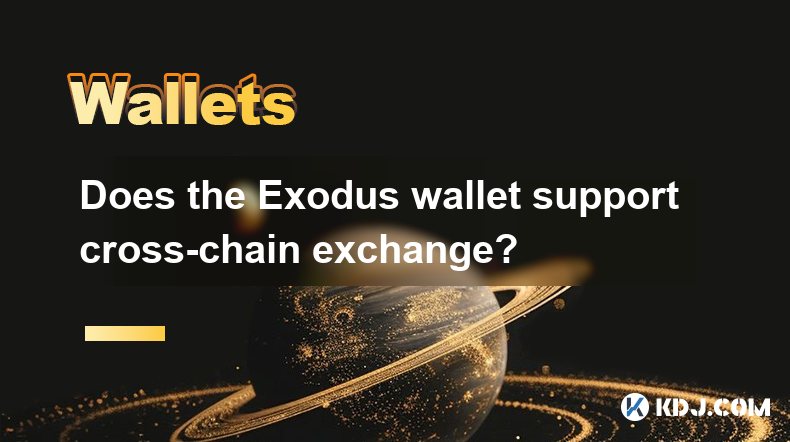
The Exodus wallet is a popular choice among cryptocurrency enthusiasts due to its user-friendly interface and robust security features. One of the key features that many users are interested in is the ability to perform cross-chain exchanges. In this article, we will explore whether the Exodus wallet supports cross-chain exchange, how it works, and what users need to know to make the most of this feature.
What is Cross-Chain Exchange?
Cross-chain exchange refers to the process of swapping one cryptocurrency for another across different blockchain networks. This is particularly useful for users who want to diversify their portfolio or take advantage of opportunities on different blockchains. Cross-chain exchanges can be facilitated through decentralized exchanges (DEXs), centralized exchanges (CEXs), or through wallet-integrated services.
Does Exodus Wallet Support Cross-Chain Exchange?
Yes, the Exodus wallet does support cross-chain exchange. This feature is integrated directly into the wallet, allowing users to swap between different cryptocurrencies without needing to use an external exchange. The process is streamlined and user-friendly, making it accessible even for those new to the world of cryptocurrencies.
How to Perform a Cross-Chain Exchange in Exodus Wallet
Performing a cross-chain exchange in the Exodus wallet is straightforward. Here are the steps you need to follow:
- Open the Exodus wallet and navigate to the portfolio section.
- Select the cryptocurrency you want to exchange from your list of assets.
- Click on the "Exchange" button next to the selected cryptocurrency.
- Choose the cryptocurrency you want to exchange to from the list of available options.
- Enter the amount you wish to exchange and review the transaction details.
- Confirm the exchange and wait for the transaction to be processed.
The entire process is designed to be quick and efficient, ensuring that users can easily manage their assets across different blockchains.
Supported Cryptocurrencies for Cross-Chain Exchange
Exodus wallet supports cross-chain exchanges for a wide range of cryptocurrencies. Some of the most popular options include:
- Bitcoin (BTC)
- Ethereum (ETH)
- Litecoin (LTC)
- Bitcoin Cash (BCH)
- Ripple (XRP)
- Cardano (ADA)
- Stellar (XLM)
- Tether (USDT)
- Polkadot (DOT)
- Chainlink (LINK)
This list is not exhaustive, and Exodus regularly updates its supported assets to include new and emerging cryptocurrencies.
Benefits of Using Exodus for Cross-Chain Exchange
There are several benefits to using the Exodus wallet for cross-chain exchanges. These include:
- User-Friendly Interface: The wallet's design is intuitive, making it easy for users to navigate and perform exchanges.
- Security: Exodus prioritizes security, ensuring that your assets are protected during the exchange process.
- No Need for External Exchanges: Users can perform cross-chain exchanges directly within the wallet, eliminating the need to transfer funds to a third-party exchange.
- Wide Range of Supported Assets: Exodus supports a diverse range of cryptocurrencies, giving users plenty of options for their exchanges.
- Quick and Efficient: The exchange process is streamlined, allowing for quick and efficient transactions.
Limitations and Considerations
While the Exodus wallet offers a robust solution for cross-chain exchanges, there are some limitations and considerations that users should be aware of:
- Fees: There may be fees associated with cross-chain exchanges, which can vary depending on the cryptocurrencies involved and the current network conditions.
- Liquidity: The availability of certain cryptocurrencies for exchange can be affected by liquidity, which may impact the speed and efficiency of the transaction.
- Network Congestion: During times of high network congestion, cross-chain exchanges may take longer to process.
- Regulatory Compliance: Users should be aware of any regulatory requirements or restrictions that may apply to their transactions.
Security Measures in Exodus Wallet
Exodus wallet takes several measures to ensure the security of your assets during cross-chain exchanges. These include:
- Encryption: All data and transactions are encrypted to protect against unauthorized access.
- Private Key Management: Exodus uses a 12-word recovery phrase to manage private keys, ensuring that users have full control over their assets.
- Two-Factor Authentication (2FA): Users can enable 2FA for an additional layer of security.
- Regular Updates: Exodus regularly updates its software to address any potential security vulnerabilities.
How to Maximize the Benefits of Cross-Chain Exchange in Exodus
To make the most of the cross-chain exchange feature in Exodus, consider the following tips:
- Stay Informed: Keep up-to-date with the latest news and developments in the cryptocurrency space to make informed decisions about your exchanges.
- Monitor Fees: Be aware of the fees associated with cross-chain exchanges and plan your transactions accordingly.
- Diversify Your Portfolio: Use cross-chain exchanges to diversify your cryptocurrency holdings and reduce risk.
- Use the Built-In Tools: Take advantage of the tools and features provided by Exodus, such as the portfolio tracker and price alerts, to manage your assets effectively.
Common Issues and Troubleshooting
While the Exodus wallet is designed to be user-friendly, users may encounter some common issues when performing cross-chain exchanges. Here are some troubleshooting tips:
- Transaction Delays: If your transaction is taking longer than expected, check the network status of the blockchains involved. High congestion can cause delays.
- Insufficient Funds: Ensure that you have enough of the cryptocurrency you are exchanging to cover the transaction fees.
- Error Messages: If you receive an error message during the exchange process, check the Exodus support page for solutions or contact customer support for assistance.
- Wallet Sync Issues: If your wallet is not syncing properly, try restarting the application or checking your internet connection.
Future Developments and Updates
Exodus is committed to continuously improving its services and features. Future developments may include:
- Additional Supported Cryptocurrencies: Exodus may add support for more cryptocurrencies, expanding the options available for cross-chain exchanges.
- Enhanced Security Features: New security measures may be implemented to further protect users' assets.
- Improved User Interface: Updates to the user interface could make the cross-chain exchange process even more intuitive and user-friendly.
- Integration with More DEXs: Exodus may integrate with additional decentralized exchanges to provide more options for cross-chain exchanges.
Conclusion
The Exodus wallet offers a robust and user-friendly solution for cross-chain exchanges, allowing users to easily swap between different cryptocurrencies. By understanding how to use this feature effectively and being aware of the associated benefits and limitations, users can make the most of their cryptocurrency investments. As the cryptocurrency space continues to evolve, Exodus remains committed to providing innovative solutions to meet the needs of its users.
Common Questions and Answers
Q: What is cross-chain exchange?
A: Cross-chain exchange is the process of swapping one cryptocurrency for another across different blockchain networks. This allows users to diversify their portfolio and take advantage of opportunities on different blockchains.
Q: Does the Exodus wallet support cross-chain exchange?
A: Yes, the Exodus wallet supports cross-chain exchange. Users can perform these exchanges directly within the wallet without needing to use an external exchange.
Q: How do I perform a cross-chain exchange in the Exodus wallet?
A: To perform a cross-chain exchange in the Exodus wallet, open the wallet, select the cryptocurrency you want to exchange, click on the "Exchange" button, choose the cryptocurrency you want to exchange to, enter the amount, and confirm the exchange.
Q: What cryptocurrencies are supported for cross-chain exchange in Exodus?
A: Exodus supports cross-chain exchanges for a wide range of cryptocurrencies, including Bitcoin (BTC), Ethereum (ETH), Litecoin (LTC), Bitcoin Cash (BCH), Ripple (XRP), Cardano (ADA), Stellar (XLM), Tether (USDT), Polkadot (DOT), and Chainlink (LINK), among others.
Q: What are the benefits of using Exodus for cross-chain exchange?
A: The benefits include a user-friendly interface, high security, no need for external exchanges, a wide range of supported assets, and quick and efficient transactions.
Q: Are there any limitations to using Exodus for cross-chain exchange?
A: Yes, there may be fees associated with cross-chain exchanges, liquidity can affect the availability of certain cryptocurrencies, network congestion can cause delays, and users should be aware of any regulatory requirements or restrictions.
Q: How does Exodus ensure the security of cross-chain exchanges?
A: Exodus ensures security through encryption, private key management with a 12-word recovery phrase, two-factor authentication, and regular software updates to address potential vulnerabilities.
Q: What can I do to maximize the benefits of cross-chain exchange in Exodus?
A: To maximize benefits, stay informed about the cryptocurrency market, monitor fees, diversify your portfolio, and use the built-in tools provided by Exodus.
Q: What should I do if I encounter issues with cross-chain exchanges in Exodus?
A: If you encounter issues, check for transaction delays due to network congestion, ensure you have sufficient funds to cover fees, review error messages on the Exodus support page, and check for wallet sync issues.
Q: What future developments can we expect from Exodus regarding cross-chain exchange?
A: Future developments may include support for additional cryptocurrencies, enhanced security features, an improved user interface, and integration with more decentralized exchanges.
Disclaimer:info@kdj.com
The information provided is not trading advice. kdj.com does not assume any responsibility for any investments made based on the information provided in this article. Cryptocurrencies are highly volatile and it is highly recommended that you invest with caution after thorough research!
If you believe that the content used on this website infringes your copyright, please contact us immediately (info@kdj.com) and we will delete it promptly.
- Tether, Bitcoin, and the Public Listing Frenzy: A New Era for Corporate Crypto?
- 2025-07-02 04:30:12
- Token Yugijo, Coin Flips & Meme Coins: What's Hot?
- 2025-07-02 04:30:12
- Powell, Stablecoin Regulation, and Circle's Bold Move: A New York Minute on Crypto's Future
- 2025-07-02 02:30:12
- Ethereum Price, Tom Lee, and Bitcoin: A New Era for Crypto?
- 2025-07-02 02:30:12
- Hoskinson, Ripple, Cardano DeFi: A New Era of Collaboration?
- 2025-07-02 02:35:12
- BlockDAG, ALGO, and the Crypto Trends Shaping 2025
- 2025-07-02 01:50:12
Related knowledge
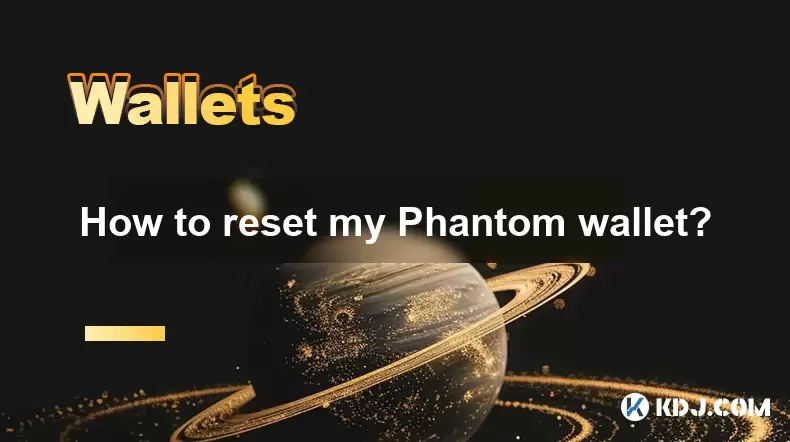
How to reset my Phantom wallet?
Jul 02,2025 at 12:36am
Understanding the Need for Resetting Your Phantom WalletIf you're using a Phantom wallet, you may encounter situations where resetting your wallet becomes necessary. This could be due to forgotten passwords, seed phrase issues, or account corruption. Phantom is a non-custodial wallet primarily used for interacting with the Solana blockchain, and it stor...
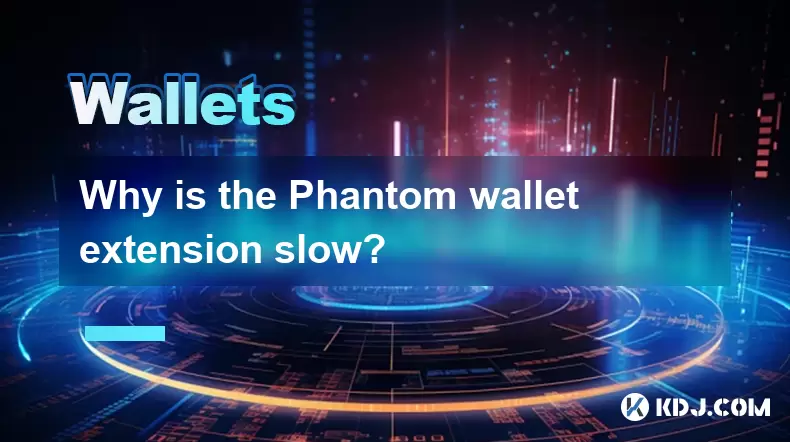
Why is the Phantom wallet extension slow?
Jul 02,2025 at 04:15am
Phantom Wallet Extension: Why Is It Slow?Phantom wallet is a widely used browser extension for interacting with decentralized applications (dApps) on the Solana blockchain. Despite its popularity, some users report that the Phantom wallet extension runs slowly at times. This article delves into potential reasons behind this performance issue and provide...
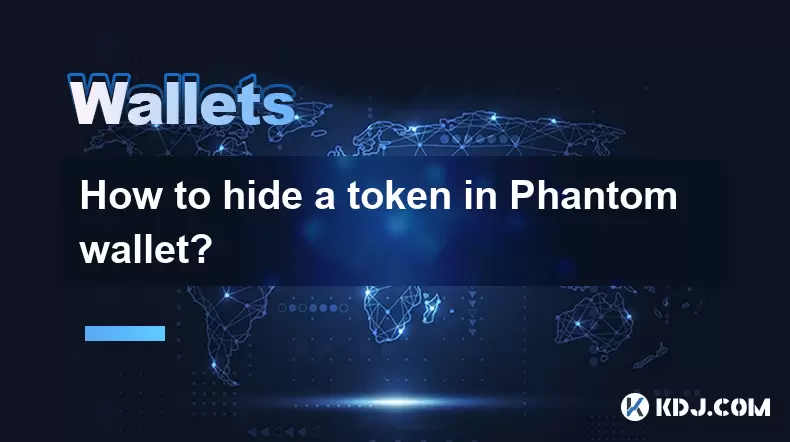
How to hide a token in Phantom wallet?
Jul 01,2025 at 05:49pm
Understanding the Phantom Wallet InterfacePhantom wallet is a popular non-custodial wallet used primarily for interacting with the Solana blockchain. It allows users to store, send, receive, and manage various tokens, including both fungible and non-fungible tokens (NFTs). Before attempting to hide a token, it's essential to understand how the wallet in...
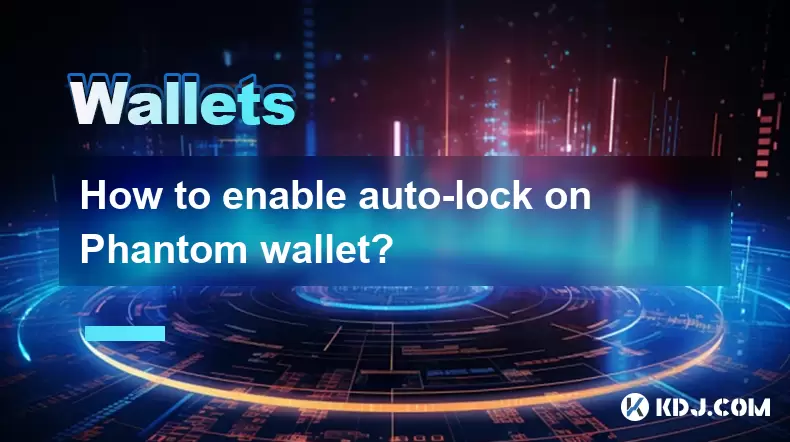
How to enable auto-lock on Phantom wallet?
Jul 01,2025 at 04:01pm
What is Auto-Lock in Phantom Wallet?Phantom wallet is a popular non-custodial cryptocurrency wallet used primarily for interacting with the Solana blockchain. One of its security features includes the ability to set an auto-lock timer, which ensures that the wallet locks itself automatically after a period of inactivity. Auto-lock enhances security by p...
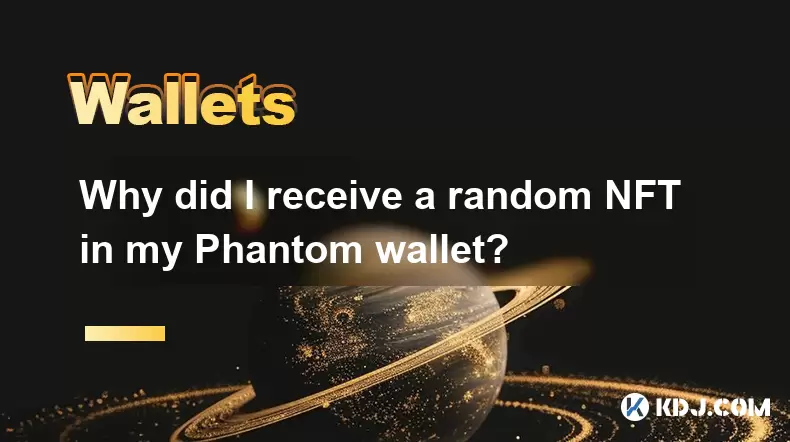
Why did I receive a random NFT in my Phantom wallet?
Jul 01,2025 at 09:00pm
Receiving an Unexpected NFT in Your Phantom WalletIf you've recently opened your Phantom wallet and noticed an unfamiliar NFT appearing in your collection, you're not alone. Many users have reported receiving random or unsolicited non-fungible tokens, often without any prior interaction with the project or sender. This phenomenon has become increasingly...
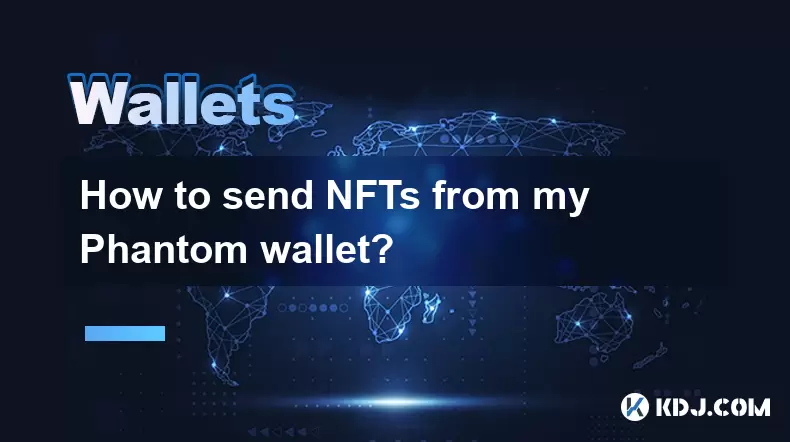
How to send NFTs from my Phantom wallet?
Jul 02,2025 at 03:15am
What is Phantom Wallet and Why Use It for NFT Transfers?Phantom wallet is a non-custodial cryptocurrency wallet primarily used for interacting with the Solana blockchain. It supports both tokens and NFTs, making it a popular choice among users who engage in decentralized finance (DeFi) or digital collectibles. The interface is user-friendly, allowing ev...

How to reset my Phantom wallet?
Jul 02,2025 at 12:36am
Understanding the Need for Resetting Your Phantom WalletIf you're using a Phantom wallet, you may encounter situations where resetting your wallet becomes necessary. This could be due to forgotten passwords, seed phrase issues, or account corruption. Phantom is a non-custodial wallet primarily used for interacting with the Solana blockchain, and it stor...

Why is the Phantom wallet extension slow?
Jul 02,2025 at 04:15am
Phantom Wallet Extension: Why Is It Slow?Phantom wallet is a widely used browser extension for interacting with decentralized applications (dApps) on the Solana blockchain. Despite its popularity, some users report that the Phantom wallet extension runs slowly at times. This article delves into potential reasons behind this performance issue and provide...

How to hide a token in Phantom wallet?
Jul 01,2025 at 05:49pm
Understanding the Phantom Wallet InterfacePhantom wallet is a popular non-custodial wallet used primarily for interacting with the Solana blockchain. It allows users to store, send, receive, and manage various tokens, including both fungible and non-fungible tokens (NFTs). Before attempting to hide a token, it's essential to understand how the wallet in...

How to enable auto-lock on Phantom wallet?
Jul 01,2025 at 04:01pm
What is Auto-Lock in Phantom Wallet?Phantom wallet is a popular non-custodial cryptocurrency wallet used primarily for interacting with the Solana blockchain. One of its security features includes the ability to set an auto-lock timer, which ensures that the wallet locks itself automatically after a period of inactivity. Auto-lock enhances security by p...

Why did I receive a random NFT in my Phantom wallet?
Jul 01,2025 at 09:00pm
Receiving an Unexpected NFT in Your Phantom WalletIf you've recently opened your Phantom wallet and noticed an unfamiliar NFT appearing in your collection, you're not alone. Many users have reported receiving random or unsolicited non-fungible tokens, often without any prior interaction with the project or sender. This phenomenon has become increasingly...

How to send NFTs from my Phantom wallet?
Jul 02,2025 at 03:15am
What is Phantom Wallet and Why Use It for NFT Transfers?Phantom wallet is a non-custodial cryptocurrency wallet primarily used for interacting with the Solana blockchain. It supports both tokens and NFTs, making it a popular choice among users who engage in decentralized finance (DeFi) or digital collectibles. The interface is user-friendly, allowing ev...
See all articles


























